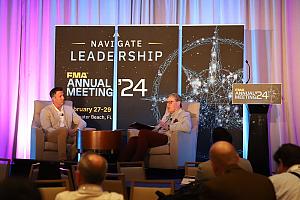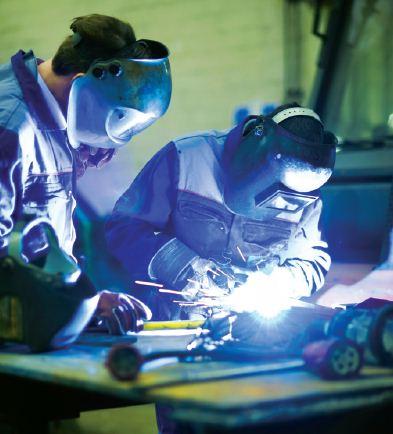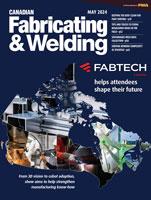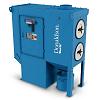- FMA
- The Fabricator
- FABTECH
- Canadian Metalworking
Welder Education
It should be what you've learned, not where you learned it.
- By Canadian Metalworking
- November 7, 2014
Let’s look at an area where there is a lot more talking then there is action — welder education.
As an industry, we have spent a lot of time talking, having meetings, floating ideas, and maybe more than just a bit of staring at our feet, in an attempt to get at the underlying issues that have resulted in the current shortage of skilled Canadian welding professionals in this country.
Considering all the upcoming projects across the country that will rely on welding, it would seem that, even at a national level, meeting the numerous provincial welder demands for these projects in the next few years is going to be a huge challenge. Yet, here we are, still looking for a solution…
The challenge seems to be one of logistics and alignment as it applies to industry’s need for better education and more welding professionals.
As things stand right now, the Canadian model for welder education is one that is focused on creating provincial welders who are, in theory, trained to serve industries within their province. That is fine (and I should add, also good business) for regional schools, provincial regulators and governments, but I’m not convinced it solves any of the underlying problems from a national perspective.
There are still too few welding professionals available when and where they are needed, and there is still too much disparity with respect to what they were taught and how they were measured/assessed before heading out in to the job market.
So looking at the problem from industry’s perspective, I think it is fair to ask some questions: Where are all the welding professionals going to come from? Who is creating and teaching the programs that will create these people? Who is going to set the national standardization for education and assessment? Who is going to provide the resulting data industry needs to quickly and cost effectively determine a good hire from a bad hire? And finally, who is going to pay for all of this?
I suspect that, at some level, industry already knows who to ask these questions to—they include provincial boards of education, colleges, universities, apprentice boards, regulators, industry associations and government agencies. That said, knowing who to ask and getting the answers needed are sometimes two very different things. The same logic applies to moving beyond asking questions and giving answers—someone, sometime is going to need to take some action to start making this right.
The problem is there are lots of people that have a piece of the “education pie” and that creates a lot of players for industry to deal with.
Everyone has an opinion, most have a mandate, and few have any influence beyond their local area. This results in what best can be described as a large “distributed bureaucracy” when expanded across all provinces and territories. Don’t get me wrong, there is value in this, but it comes with the following issues.
Lack of Funding, Inaction and Pride–Assuming industry is actually able to wade through the bureaucracy, things are further complicated by a number of other issues, namely: Funding, Inaction and Pride. Let’s look at these in a bit of detail:
Funding and Inaction - Fixing any problem requires action and all actions have an associated cost. As can be expected, finding funding is a universal issue for all, including industry itself. Even if there is a need and an agreed upon action, the question is always going to be: Who is paying to get it done? It is fair to say, though, that there are not a lot of players putting up their hands to volunteer. Talk is cheap—action is expensive!
Pride – Now on to the age-old problems of perceived stature or superiority—let’s just call it ego. Ego makes people, institutions and organizations put up roadblocks that stop progress.
In the absence of hard facts, ego fosters a “we are the best” attitude and a resentment to change. The reality is not all welding programs are good, and not all welders from all programs are great welders; but you would never know by asking those involved. Everything is always great until things can be equally and independently measured. Truth, through the act of measuring and assessing, removes the influence of ego.
What is important to understand is that all these factors impact education and industry. Consider this, how does industry determine if a welding professional from college A is actually better than one from college B? Is this based on marks, the course material, the instructors, what the school says about its program? If you ask both A and B, both will tell you their welders (and associated programs) are the best, but really, how would anyone in industry actually know the truth? There are no comprehensive standardized measures, assessments, or processes that allow industry to make a truly informed decision. We are asked to believe that they know best.
As such, it is unlikely that education providers will come up with a measure or uniform assessment, as it puts their investment in staff, programs and reputation at risk.
Everyone wants to be the best, and no one wants to be shown as lacking.
It is possible for provinces to enact standards, measures and assessment, but at best they will only let an employer evaluate what going on locally. This also creates the opportunity for “walled gardens” within education, where only a select group of organizations within a given region get to deliver a program. With their government backing, these programs become “protected” and force industry into a situation where there are no alternatives but to put up with the ‘output.’ In such scenarios, any required change happens slowly, under the exclusive control of the educators or government departments, not the market they serve.
Consider Red Seal, arguably one of Canada’s only national education ‘programs,’ has been around since the 1950, yet we still don’t have practical assessments, or a single page of course material. Outlines and guidelines are great, but they don’t solve the problem, as for what actually gets done, course wise, is up to each regional set of players.
Assuming you agree that knowledge and skill trump where they were acquired then there’s a couple of things everyone can do: 1) Industry should demand nationalized training material and assessment; not sometime in the future, but now. 2) Educators should understand they work for industry; adopting a fully backed national program should be a given, not an option. 3) All levels of government need to think as a group, working together to deliver on the needs of both industry and the people they employ.
Let’s not forget or lose sight of one key thing: In the end, it is industry that employs welding professionals and it is these two groups of people that help pay taxes that allow governments and education providers to operate.
subscribe now


Keep up to date with the latest news, events, and technology for all things metal from our pair of monthly magazines written specifically for Canadian manufacturers!
Start Your Free SubscriptionAbout the Author
- Industry Events
Automate 2024
- May 6 - 9, 2024
- Chicago, IL
ANCA Open House
- May 7 - 8, 2024
- Wixom, MI
17th annual Joint Open House
- May 8 - 9, 2024
- Oakville and Mississauga, ON Canada
MME Saskatoon
- May 28, 2024
- Saskatoon, SK Canada
CME's Health & Safety Symposium for Manufacturers
- May 29, 2024
- Mississauga, ON Canada






















